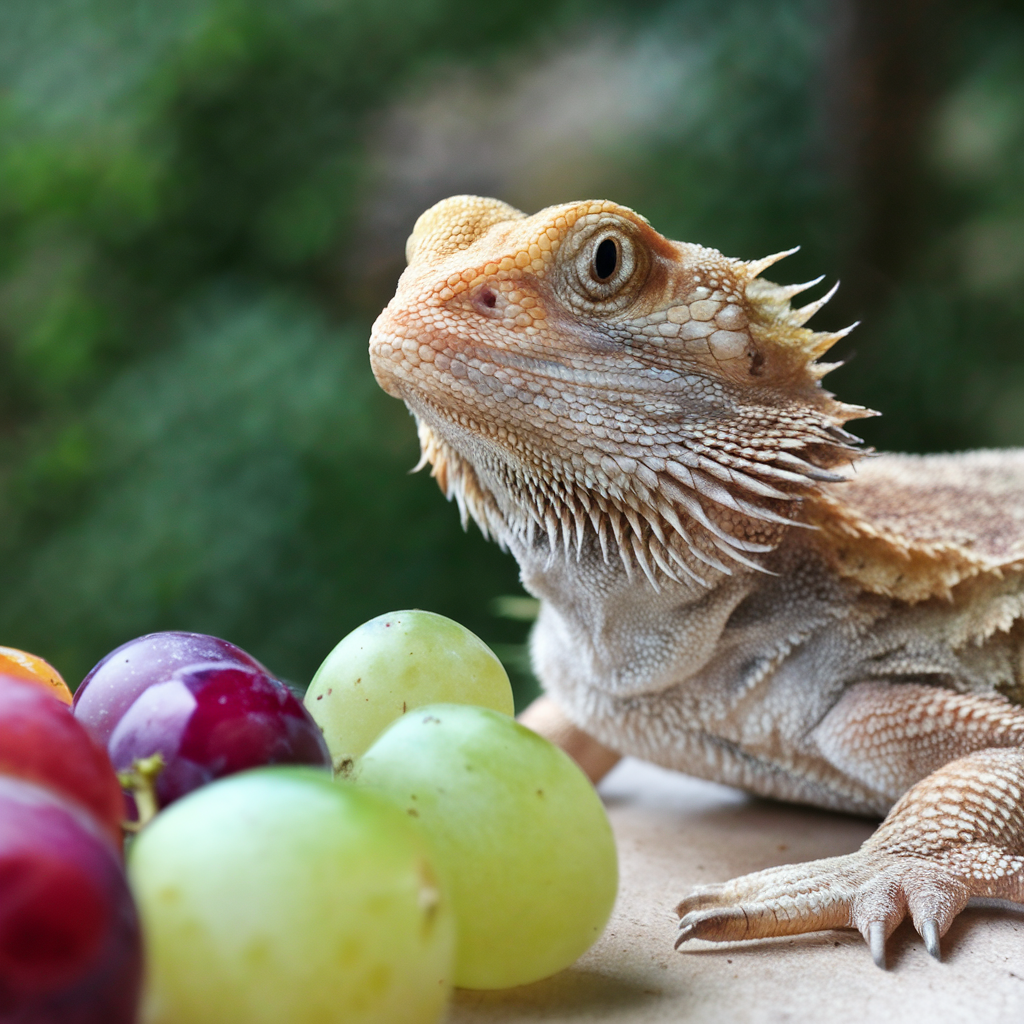Grapes, with their juicy sweetness and rich nutritional profile, are a favorite fruit among many. These small fruits are packed with vitamins, minerals, and antioxidants, making them a healthy snack for humans. But do we have the same taste buds as our beardies? Can bearded dragons eat grapes? This article explores the potential benefits and risks of feeding grapes to bearded dragons, offering guidance for pet owners on responsibly including grapes in their pet’s diet.
Nutritional Overview
Grapes are a good source of vitamins C and K, as well as antioxidants and fiber. They also contain small amounts of calcium, potassium, and magnesium. However, their high sugar content and relatively low calcium-to-phosphorus ratio can be points of concern when considering them for a bearded dragon’s diet.
Can Bearded Dragons Eat Grapes?

Bearded dragons can eat grapes, but they should be offered sparingly and infrequently due to their high sugar content and imbalanced calcium-to-phosphorus ratio. Grapes can be a tasty treat that provides hydration and some nutritional benefits, but they should not be a regular part of a bearded dragon’s diet.
Benefits of Grapes for Bearded Dragons
- Hydration: Grapes are high in water content, making them a refreshing treat that can help with hydration.
- Vitamins and Antioxidants: The vitamins and antioxidants in grapes can support the immune system and overall health of bearded dragons.
Risks and Considerations
- Sugar Content: The high sugar content in grapes can lead to obesity and dental problems if fed excessively.
- Calcium-to-Phosphorus Ratio: Grapes have more phosphorus than calcium, which can hinder calcium absorption and potentially lead to metabolic bone disease over time.
- Pesticides: Grapes often have pesticide residues, so washing them thoroughly or opting for organic grapes is important.
How to Safely Prepare Grapes for Your Bearded Dragon
- Choose fresh, organic grapes to minimize exposure to pesticides.
- Wash the grapes thoroughly under running water to remove any residues.
- Cut the grapes into smaller pieces or quarters to prevent choking and ensure easy digestion.
- Offer grapes as an occasional treat, no more than once a week, and in small quantities.
Alternatives to Grapes
Considering the risks associated with feeding grapes to bearded dragons, here are some healthier alternatives:

- Blueberries and blackberries are lower in sugar and antioxidants, making them a better occasional treat.
- Raspberries: Offer fiber and vitamins with a lower sugar content than grapes.
- Collard Greens: A nutrient-rich vegetable that should form the basis of a bearded dragon’s diet, providing essential calcium without the high sugar content.
These alternatives can provide the variety and nutritional benefits that bearded dragons need without the risks posed by the high sugar content and imbalanced nutrients in grapes.
FAQs
Q: How often can I feed my bearded dragon grapes?
A: Grapes should be given sparingly, not exceeding once a week, and in small quantities due to their high sugar content and nutritional profile.
Q: Do I need to remove the grape skins?
A: No, the skins of grapes are not harmful to bearded dragons and contain additional nutrients and fiber. Just ensure the grapes are cut into manageable pieces.
Conclusion – Can Bearded Dragons Eat Grapes?
While bearded dragons can eat grapes, they should only do so occasionally and in moderation due to the potential health risks associated with their high sugar content and calcium-to-phosphorus ratio. By offering grapes as a rare treat and focusing on a balanced diet rich in vegetables and appropriate fruits, you can ensure your bearded dragon enjoys both variety and nutritional adequacy in their diet.






